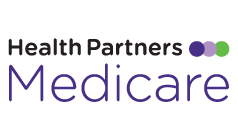Know Your Options
When you need care fast, it’s important to know where to turn. Some cases are emergencies. If you have an emergency, call 911 or go to the nearest emergency room. If you aren’t having an emergency, going to the ER can mean a long wait. Plus, you could be making it harder for the staff there to help the people who really need them. So what do you do when you have a sudden sickness or injury?
As a Health Partners Medicare member, you have options. Your primary care provider (PCP) should be your first choice for many problems. However, there are also urgent care centers and walk-in clinics. Health Partners Medicare members can also talk to a doctor by phone or video chat with Teladoc®. Read below to learn more about each option and see a chart showing common conditions and where to go for help.
Primary care provider
Your PCP is your medical home. He or she coordinates your care. See your PCP if you can. Many offices offer extended hours. You can also leave a message for the doctor after hours. Most offices have an on-call physician who will call you back.
Walk-in clinics and urgent care centers
Walk-in clinics and urgent care centers offer evening and weekend hours. They will see you without an appointment. The average wait time is 45 minutes. It’s important to remember that they do different things. Urgent care centers are “one-stop shopping.” They can do most lab work, take X-rays, place IVs and apply stitches. Walk-in clinics offer convenience, but offer fewer services. They are usually found in drug stores and supermarkets.
Teladoc®
Teladoc is a special service offered at no cost to Health Partners Medicare members. With Teladoc, you have 24/7 access to board-certified doctors. The maximum wait time for a doctor to call you back is 15 minutes. You can “visit” over the phone or by video call on a computer, cell phone or tablet. The doctor can answer questions and even send some short-term prescriptions to your pharmacy. It’s helpful if you take 10 minutes now to register so that you can get care when you need it. Call 1-800-TELADOC (1-800-835-2362), visit www.teladoc.com or download the app.
Common conditions and where to go
|
Condition |
PCP |
Urgent Care |
Walk-in Clinic |
Teladoc |
ER |
|
Aches, pains and sprains |
Yes |
Yes |
Yes |
Yes |
No |
|
Bleeding (uncontrollable) |
No |
No |
No |
No |
Yes |
|
Breathing difficulty |
No |
No |
No |
No |
Yes |
|
Broken bones |
No |
Yes (less serious) |
Yes |
No |
Yes (serious) |
|
Diarrhea or nausea |
Yes |
Yes |
Yes |
Yes |
No |
|
Fever, flu, or cold symptoms |
Yes |
Yes |
Yes |
Yes |
No |
|
High fever* |
No |
No |
No |
No |
Yes |
|
Head injury (conscious) |
No |
Yes |
No |
No |
Yes |
|
Heart attack** |
No |
No |
No |
No |
Yes |
|
Infections (yeast, urinary, etc.) |
Yes |
Yes |
Yes |
Yes |
No |
|
Lab tests |
Call |
Yes |
Call |
No |
No |
|
Poisoning or overdose |
No |
No |
No |
No |
Yes |
|
Pregnancy problems |
No |
No |
No |
No |
Yes |
|
Seizure, convulsions, passing out |
No |
No |
No |
No |
Yes |
|
Skin rashes or insect bites |
Yes |
Yes |
Yes |
Yes |
No |
|
Splinter |
Yes |
Yes |
Yes |
No |
No |
|
Stiches (removal) |
Yes |
Yes |
Yes |
No |
No |
|
Stitches (needed) |
Call |
Yes |
No |
No |
Yes |
|
Stroke*** |
No |
No |
No |
No |
Yes |
|
Suicidal or homicidal |
No |
No |
No |
No |
Yes |
|
Vaccines |
Yes |
Yes |
Yes |
No |
No |
|
Vomiting (1–2 days) |
Yes |
Yes |
Yes |
Yes |
No |
|
Wound care (minor) |
Yes |
Yes |
Yes |
Advice |
No |
*99°F or more for newborns; 104°F or more for children; 103°F or more for adults.
**Heart attack symptoms typically include chest pain, nausea, shortness of breath, extreme fatigue, fainting, dizziness.
***Stroke symptoms typically include loss of vision, sudden numbness, weakness, slurred speech, or confusion.
This information is for informational purposes only and does not constitute medical advice. Always seek the advice of a doctor or other qualified health provider with any questions you may have regarding a medical condition. In the event of a medical emergency, call 911.

